Long summer evenings are perfect for leisurely after-work trail rides and schooling sessions. But even the idyllic summer season isn’t without a few problems. Here’s how to tackle horse health issues this season.
Hydration
An average 1,000-pound horse drinks roughly 4 to 9 gallons of water a day, but can lose up to 2 to 3 gallons of water per hour through sweat alone if in heavy work. When dehydrated, a horse will have dry gums, and his skin will “tent” when pinched and not pop back into place immediately. A severely dehydrated horse will act colicky. His muscles will cramp and he may overheat if his ability to sweat is hampered.
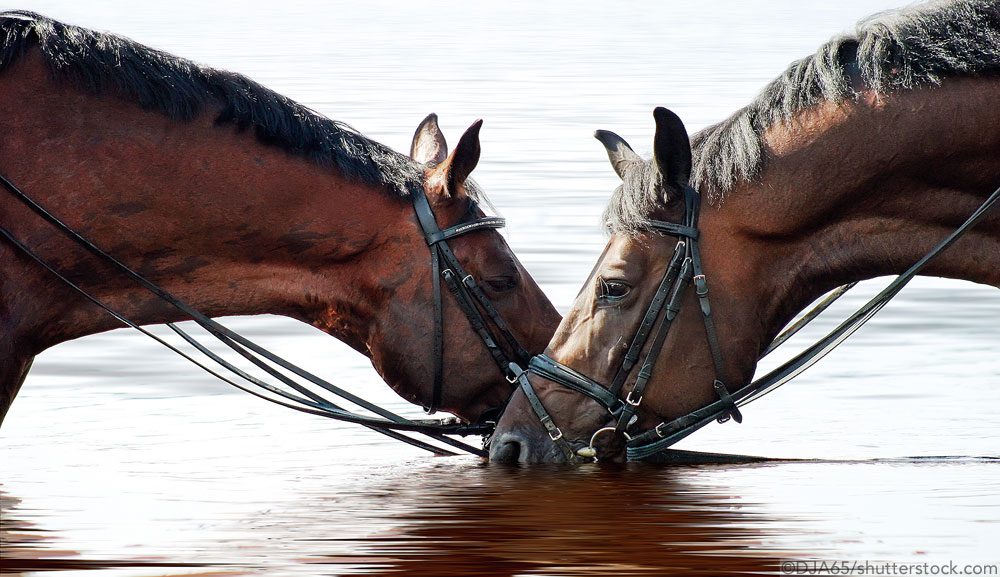
Heat stress compounded with dehydration is a very serious condition that can result in shock and kidney damage. The normal rectal temperature of a horse is 99 to 101 degrees F. During exercise, a horse’s temperature can rise to 103, but will begin to lower quickly during cool-down. A rectal temperature that remains above 103.5 is indicative of heat stress.
Most horse owners know the importance of having fresh water available to horses at all times, but at the height of summer, keeping your horse hydrated can take some extra vigilance.
Electrolytes
Like human athletes, horses require both water and electrolytes to replenish the sodium, chloride, and other elements lost in sweat. Most of the time, unless your horse is undergoing advanced training for elite athletic performance, a salt block is sufficient. Horses are relatively good at regulating their own intake of salt when they need it.
There are several ways you can supplement your horse’s electrolyte intake:
- Regularly check salt and mineral blocks to make sure there is enough for the horse to consume. Keep these out of the elements, as a heavy rain can dissolve a block quickly.
- Top-dressing your horse’s feed with some table salt is another method for sweat management; one tablespoon of extra salt is normally adequate.
- You can also offer electrolytes in your horse’s water with a pre-made electrolyte mix. When using this method, be sure to provide two buckets: one containing plain water and one containing the mix. Your horse will choose how much to consume.
Picky Drinkers
If you’re having trouble getting your horse to drink enough water—especially if he’s a picky drinker and you’re away from home—there a few tricks you can try.
- Offer a water-soaked gruel; complete feed pellets work for this. If your horse is on a restricted diet, use hay pellets. Soaking your horse’s hay is an easy way to get in some extra moisture as well as a handy tool to decrease dust.
- Flavoring your horse’s water can help entice him to drink, especially away from home. Gatorade, juice, molasses, and peppermint can all be used, and there are also products made specifically for this purpose available for purchase.
It’s OK for a Hot Horse to Drink—Really!
The notion that hot horses shouldn’t drink is completely false. Never restrict a horse’s access to water, especially if he is hot.
Horses that get colicky “after drinking” are mostly suffering either from muscle cramping because they were not cooled off appropriately; a metabolic disease such as tying up; or clinical dehydration (and sometimes a combination of these issues).
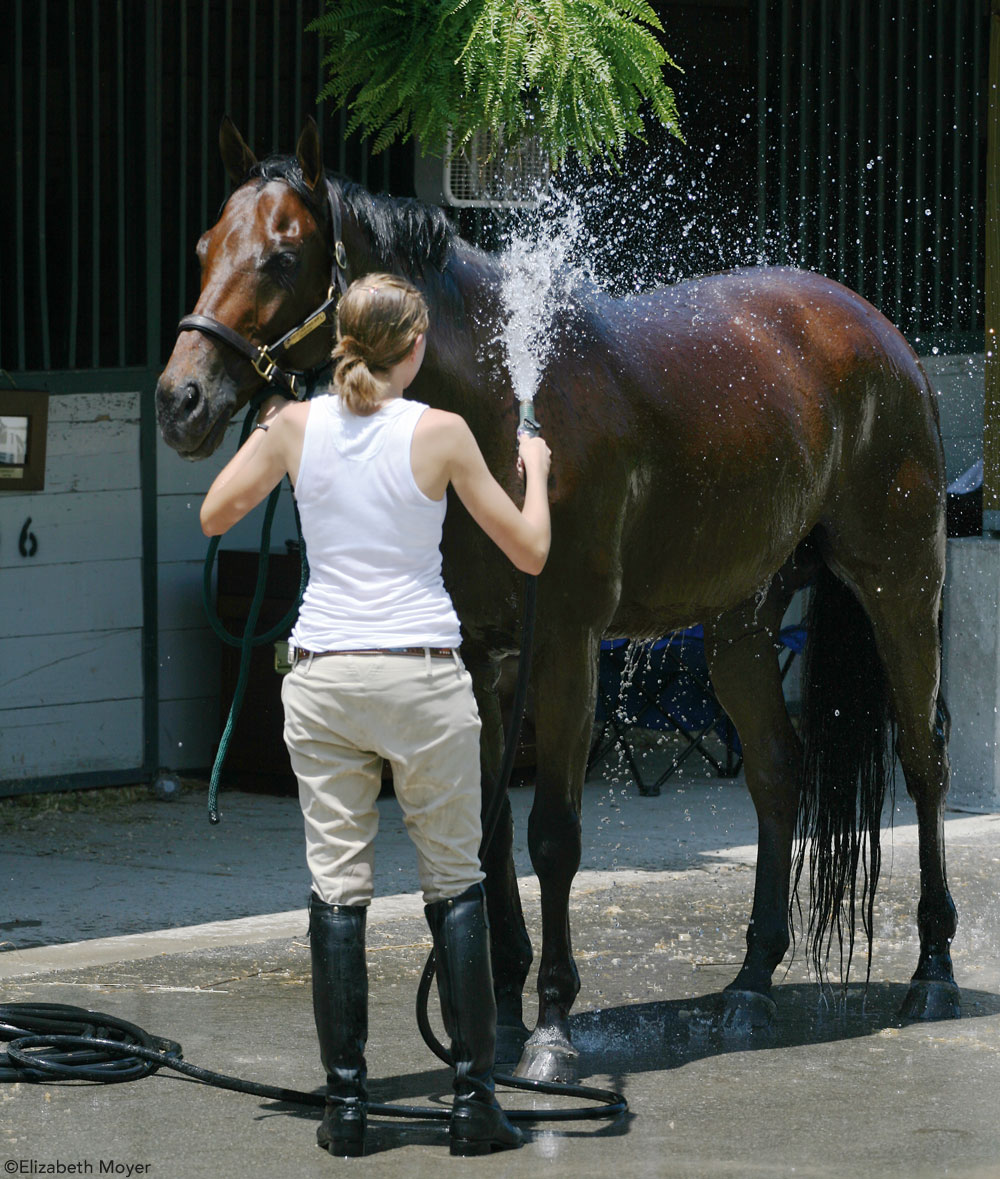
Hosing your horse off after a ride is a great way to cool him down.
Instead, the rule should be never stall a hot horse immediately after a ride. Walk him until his heart rate is back to normal (28 to 44 beats per minute for an adult horse). Respiration rate will follow heart rate, meaning as HR slows, RR slows. Body temp can be used, but remarkably doesn’t change that much until a horse is severely heat stressed (e.g., heat stroke).
Battling the Heat
When the heat is intense, especially coupled with high humidity, try to ride in the early morning or late evening. If your horse has a demanding conditioning schedule, divide workouts: Instead of a 60-minute session, ride 30 minutes in the morning and 30 in the evening.
Other ways to beat the heat and outsmart the sun include:
- Make sure your horse has access to shade when out in the pasture during the daytime. Trees or a run-in are all that’s required. If your horse’s pasture is nothing but acres of sun-scorched field, consider stabling him in the middle of the day when it’s extremely hot.
- Don’t forget a daily swipe of sunblock for gray horses or those with pink skin on their faces. Child-safe block with at least SPF 30 works great.
- Hosing your horse down after a ride is a great way for an immediate cooldown. Concentrate first on wetting the chest and neck, aiming for the jugular vein. This cools the blood as it returns to the heart, allowing for efficient internal cooling.
- When you’ve finished rinsing off your horse, use a sweat scraper to remove excess water. This is essential for effective cooling; a horse that is not scraped actually ceases to cool down as his body temperature simply heats up the water and the soaked hair acts as an insulator.
Bug Off
Biting flies, midges, mosquitoes—no question insects can be a summertime burden for horses.
At best, insects can be a nuisance, and at worse, they can spread disease, including West Nile Virus and equine encephalitis. Insects can also incite allergic reactions and cause summer sores and sweet itch.
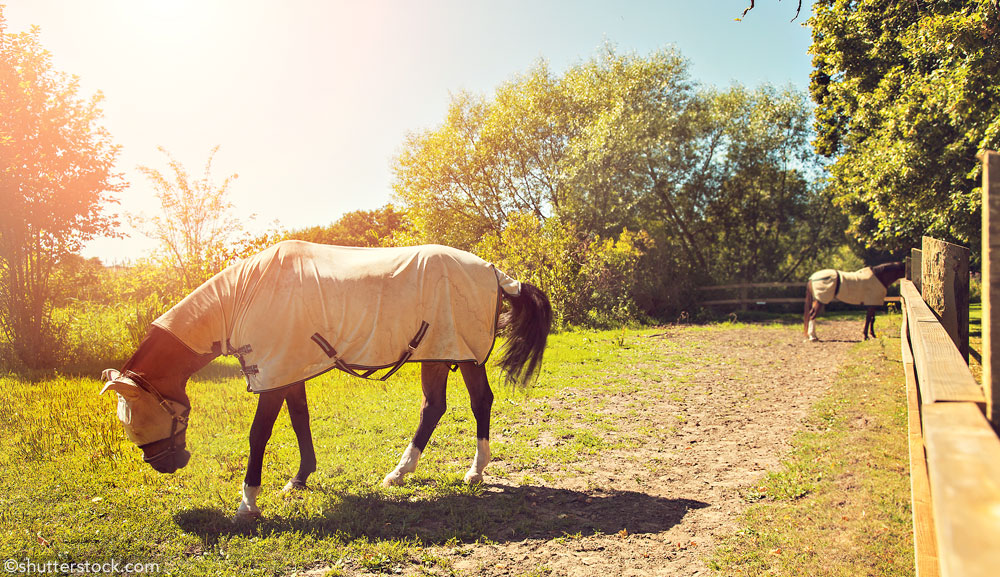
Fly sheets offer lightweight protection against pesky biting bugs.
To minimize bothersome flies around your barn and horses, follow these steps:
- Horses that have insect hypersensitivity (an allergy that can look like hives, bumps, or worn spots on the coat or along the mane or tail) should be turned out with a lightweight flysheet. Fly masks are also useful to provide relief from insect irritation.
- If your horse is stabled during the summer, set up a fan in his stall. Flies have difficulty landing when there is an air current, so a well-placed fan creating a strong breeze over a large part of your horse can drastically reduce bug bites in the stall. Air movement from fans is also key for proper barn cooling.
- Keeping manure picked up in stalls and small paddocks helps keep the fly numbers in check, as does cleaning and refilling water buckets daily. Stagnant water anywhere around the barn is a breeding haven for mosquitoes and other insects.
- If your barn uses fly tape or traps, check and replace as needed.
- Flies love filth, so keeping a clean barn will help make it less appealing. Sweep up spilled grain and dispose of your food wrappers and trash. And those empty soda cans or Gatorade bottles for when you needed a refresh after a ride? Take them home with you; sugary trash is a calling card for bugs.
Hoof Care
Dry, hard ground can be hard on a horse’s feet. Hooves can adapt to dry conditions over time, but fluctuations between damp and dry are a challenge, since hooves swell and contract (like our fingers) in response to dampness and dryness. This can predispose hooves to cracking and abscesses. Hoof cracks and lost shoes are commonly seen in the summer because dry conditions can suck moisture out of a horse’s feet.
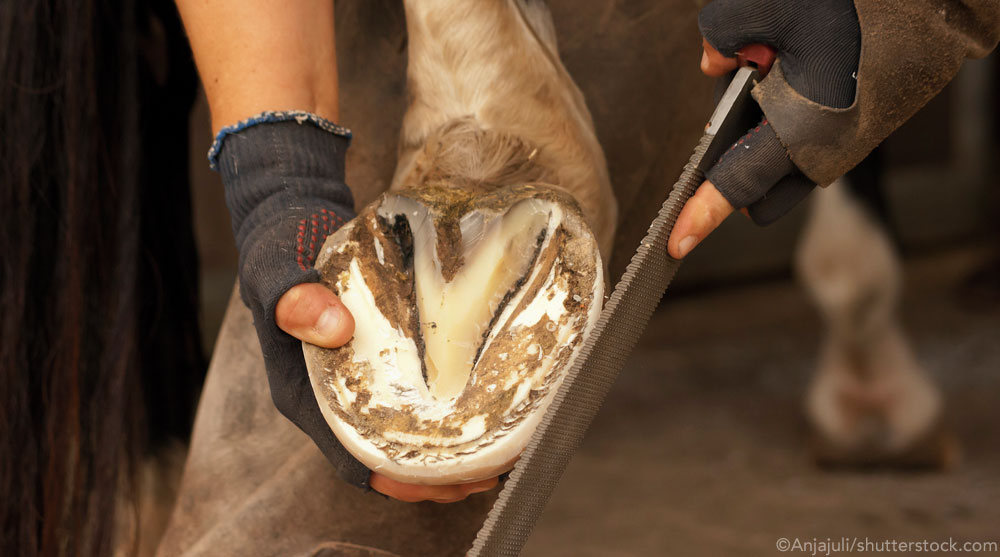
Allowing hooves to get too long makes it easier for them to crack, so keep up with your farrier appointments.
Here’s how to help your horse’s hooves this summer:
- When hosing your horse off after a ride, try not to let him stand in water for extended periods of time.
- Keep up with regularly scheduled farrier visits during the summer to keep hooves trimmed and balanced. Long toes and unbalanced wear make for easily cracked hooves due to uneven bodyweight dispersion.
- If your horse has dry or brittle hooves, applying a hoof sealant a few times a week during the dry season can help retain some of that moisture. Apply the hoof sealant on the outside wall of the lower two-thirds of the hoof, especially around nail holes.
With a little foresight, a sizzling summer doesn’t have to be stressful on your horse’s health. Get out there and have some fun in the sun.
This article originally appeared in the July 2016 issue of Horse Illustrated magazine. Click here to subscribe!


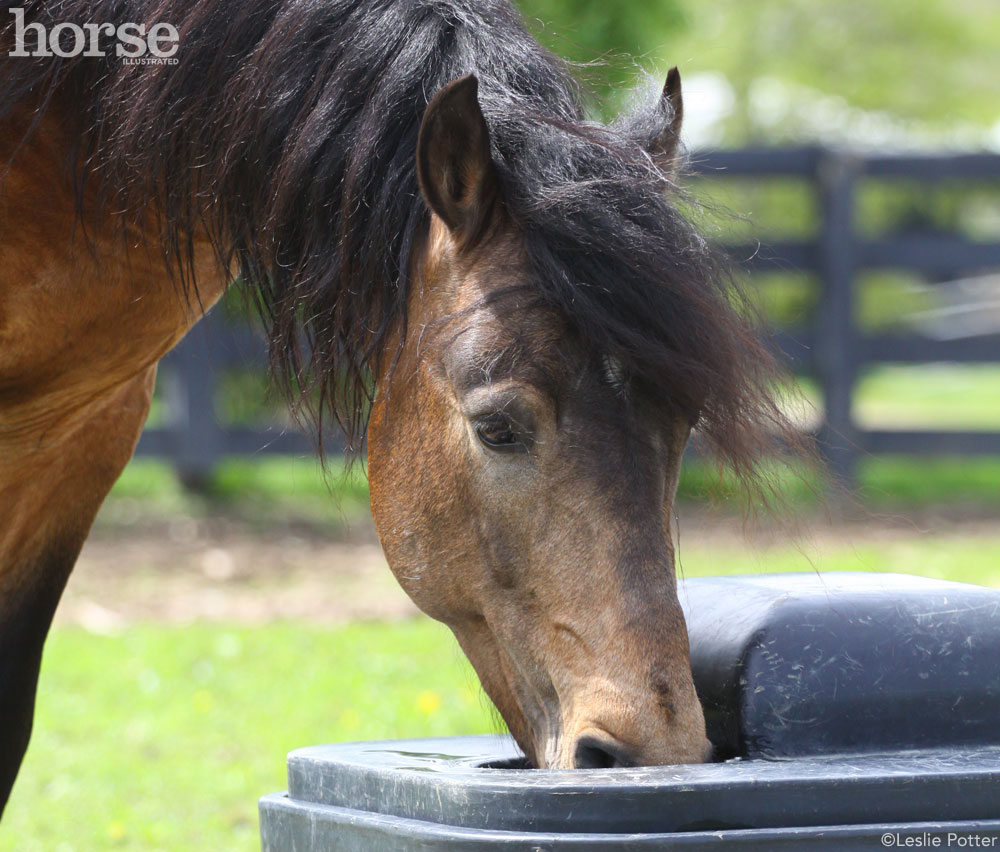
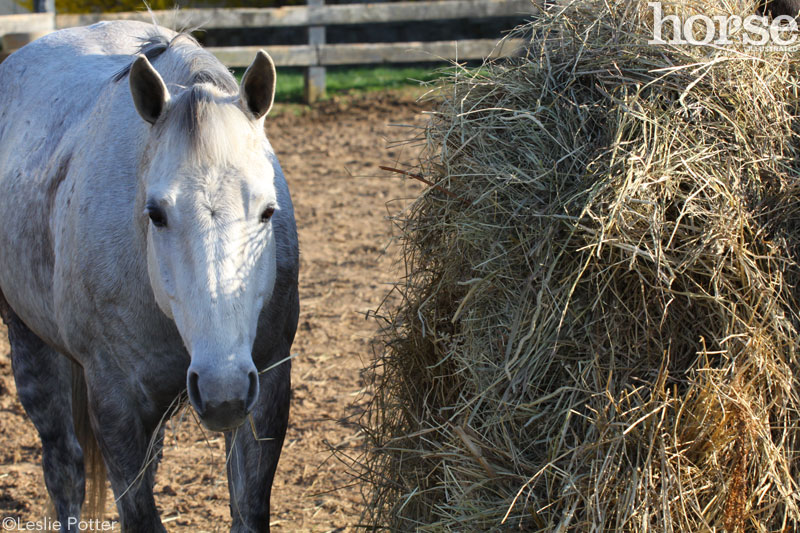

Fly exterminators have worked a miracle this summer . NO flys in the barn and we have three horses. Its economical and WORKS.
great info
Drink drink drink. Please have plenty of clean cold water for your horses plus salt tubs so they stay dehydrated.
Flys and the heat/humidity are really bad now, of course, they get bad every year.
Good information in this article.
All great tips….forgot to add plenty of love too.
Good advise and some new ideas